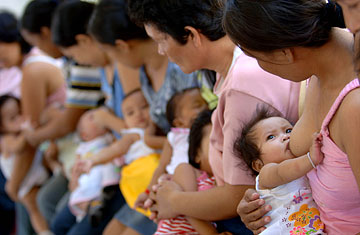
Mothers promote breastfeeding in Manila in 2006
If you want to know if Elvira Henares-Esguerra has the guts to lead a synchronized, global moment of breastfeeding taking place on Friday across 18 countries, bear in mind that this is a woman who didn't hesitate to nurse her child in front of an audience of 700 as she shared the stage with Philippines' President Gloria Macapagal-Arroyo in 2005. "You should have seen the [officers]," says Henares-Esguerra, recalling the moment her four-year-old son ran to the stage during the President's speech to inaugurate World Breastfeeding Week in the Philippines. "They all wanted to rush and catch him. But they were too slow."
Bringing more awareness to the broad benefits of breastfeeding has been a global movement for decades. Not only is breast milk considered by Unicef and many others to be the most nutritious food for babies, containing important antibodies and changing its composition as a baby grows, but studies have shown breastfeeding also has clear economic benefits for families over using milk formula products.
Through events like Friday's Synchronized Breastfeeding Worldwide, advocates like Henares-Esguerra have helped make the Philippines, which has one of Asia's highest birthrates, one of the leaders in the international legal effort to support women's right to breastfeed. Aimed at controlling aggressive marketing of formula-milk companies, particularly in developing nations, pro-breastfeeding laws target corporate practices like sponsoring maternity-related events, giving out formula samples to new mothers, and indicating on labels and advertising that their products make babies smarter. "Breastfeeding can save the lives of both mothers and infants. It may be the single most important intervention for promoting Millennium Development Goals 4 and 5 [reducing child mortality and improving maternal health]," says Grace Agrasada, professor of pediatrics at the University of the Philippines, Manila, and the country's first International Board Certified Lactation Consultant (Henares-Esguerra is the second).
In a nation like the Philippines, where nearly half the nation lives on $2 a day, the sheer economic need for more women to move to breastfeeding is striking. With roughly 25% of formula-using families in the Philippines at or below the poverty line in 2003, families are spending a full 27% of their resources on formula. To save on costs, many families over-dilute the formula or add other kinds of milk — including condensed milk — a practice that, over time, can lead to malnutrition, illness, and death. In 2005 the World Health Organization estimated the nation's total lost wages from caring for formula-fed children with diarrhea and acute respiratory infections during the first six months of life was 1 billion pesos ($21.3 million), a figure that does not include the cost of doctor visits, medicine and hospitalization that parents have to pay.
The theme of this year's World Breastfeeding Week in August — "Breastfeeding — a vital emergency response" — has proved eerily prescient in the case of the Philippines. For mothers and young children caught up in the devastation of the sort wrought by Typhoon Ondoy on Sept. 26, breastfeeding advocates say the practice can provide the key to averting a whole new set of disasters. "The availability of water, cooking utensils, and fuel is very unreliable," said Nona Andaya-Castillo, co-organizer of the synchronized breastfeeding event, in Manila, three days after the nation experienced its worst flooding in nearly 50 years. She and Henares-Esguerra had just spent the previous night with President Macapagal-Arroyo, drafting a press statement advising mothers not to accept formula-milk donations during the crisis.
